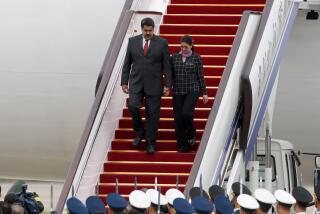Iran Sent Cable Seeking Spare Copter Parts, U.S. Firm Reports
- Share via
WASHINGTON — Iran’s desperate search for arms has taken a new twist: an attempt by the Ayatollah Ruhollah Khomeini’s regime to buy spare parts for military helicopters directly from a U.S. defense contractor.
As controversy continued over secret White House sanction of arms sales to Tehran, officials of Bell Helicopter Textron, Inc., said Tuesday that they have turned over to the FBI and Customs Service agents a cable received at the company’s Fort Worth headquarters last month from the Iranian government asking to buy spare parts for transport helicopters the firm sold to Iran during the 1970s.
“It took a lot of chutzpah,” Bell spokesman Bill Ritz said of the Iranian arms-by-cable request, “but I guess they thought they had nothing to lose.”
Sales or shipment of American-made munitions, equipment and spare parts to Iran have been officially banned by the U.S. government since the seizure of the U.S. Embassy in Tehran in 1979 by revolutionaries who had overthrown Shah Mohammed Reza Pahlavi earlier that year. But it was reported last week that the Reagan Administration had opened a covert arms pipeline to Tehran 15 months ago as part of an effort to free American hostages in Lebanon.
Dependent on U.S. Parts
Because the United States sold more than $17 billion worth of aircraft, missiles, tanks, ships and other arms to the shah during the 1970s, Khomeini inherited an arsenal heavily dependent on U.S. spare parts. The U.S. embargo had grounded hundreds of Iranian aircraft, according to intelligence sources, and severely hampered Tehran in its grueling war with Iraq.
Bell, a major producer of helicopters for the U.S. military, had sold about 500 helicopters to Iran during the 1970s, including 200 Cobra gunships and 300 utility helicopters used for troop transport. It was parts for the transport helicopters that Iran sought in its October cable, according to Ritz, Bell’s manager of media relations.
“We told them we could not comply,” Ritz said. He said the request covered “a laundry list, a variety” of parts and was rejected because “we are complying with the President’s ban on the sale of spares” to Iran.
The extent of the FBI and Customs Bureau’s interest in the Iranian request could not be determined Tuesday. Headquarters of both agencies were closed for the Veterans’ Day holiday and their spokesmen could not be reached for comment, but Ritz said that “we are cooperating with them to the fullest.”
Firm Warns Employees
The Iranian cable, first reported by the Fort Worth Star-Telegram , has prompted Bell executives to alert employees to be on guard for other possible attempts to obtain helicopter parts.
“In no uncertain terms, they know to turn down” any such requests, Ritz said. He said the company has not noticed any unusual orders of helicopter parts by other countries or companies. “We haven’t seen any rise or fall” in orders, he said.
Other defense industry executives were startled by Iran’s bold request to Bell.
“That’s a startling change in approach,” said Gary E. Simpson, vice president of Varian Associates, a Palo Alto firm that produces electron tubes used in anti-aircraft radar systems of the type the United States supplied to Iran in the 1970s.
For several years, Khomeini’s agents have been trying urgently to obtain the Varian radar tubes, according to federal court cases in San Diego and Baltimore where Customs agents posed as potential suppliers of the parts.
Iran Increases Offer
The radar units are useless without the $45,000 component and, according to conversations secretly recorded by undercover agents, Iran was willing to pay twice that amount--plus a $5,000 per tube commission--for each tube it could obtain.
Simpson said that his company has had “no contact with the Iranians.” Likewise, executives of Hughes Aircraft Co., which manufactures several radar and missile systems needed by Iran, said the company has received no Iranian requests for spare parts.
Hughes produces the Phoenix missile system for the F-14 fighters, the sophisticated craft sold to Iran in the late 1970s. Because of the lack of spare parts, Tehran’s fleet of 80 F-14s is virtually grounded, intelligence sources say.
Any request for Phoenix missile components would be promptly rejected, Hughes officials said. The Iranians “are no longer our customer,” said Lee Pitts, staff vice president for corporate communications.
More to Read
Inside the business of entertainment
The Wide Shot brings you news, analysis and insights on everything from streaming wars to production — and what it all means for the future.
You may occasionally receive promotional content from the Los Angeles Times.










